The phrase “Facebook engagement” is widely used in the digital world. You will understand what Facebook Engagement includes, as well as some ideas and examples that will surely help you post more engaging content.
Facebook engagement has become an important objective that every company aims to achieve and with good reason. According to Statista, there are over 330 million active Facebook users in India alone.
No company wants to lose out on establishing or marketing its brand on Facebook, especially with such a large number of potential consumers.
And, as a result of the current Covid -19 pandemic, the number of Facebook users has skyrocketed. This has made it more challenging because every company is attempting to have an online presence and capture the online market.
This is why we recommend that you sign up for an online Facebook ads course to understand more about the power of using Facebook to promote your brand. After all with 330 million potential customers out there, you’d not want to miss out on grabbing their attention.
So now without further ado, let’s find out what exactly is Facebook engagement all about.
So What Exactly is Facebook Engagement?
People’s actions on your Facebook Page are referred to as Facebook engagement. Likes, comments, and shares are the most common ways used to calculate engagement rates. In simple terms, when a user engages with your Facebook posts, stories, etc, it is called engagement.
So what is the Facebook engagement rate you may wonder? Well, the engagement measurement determines how effective your posts are and how well you interact with your audience.
For a detailed understanding, here are metrics related to Facebook engagement.
5 Facebook Engagement Metrics That Are Considered When Calculating The Engagement Rate:
- Likes: The number of people who like your posts. This also includes the number of people who react to your post. Likes are an indicator that tells you the resonance and acceptance by customers.
- Comments: The number of people who comment on your posts. The maximum number of posts have tagging of friends, or else some customer feedback. However, comments provide insight into how people feel about the content posted. Brands need to seriously consider customer experience through such comments.
- Shares: The number of people who share your content. Shares embark on amplification of your content which is seen by users and show that the users feel that your post was worth a ‘share’.
- Clicks/Links: The number of times a person clicks on one of your images or links. Those users will be sent to the website/app that you have linked.
- Reach: The number of individuals who have seen your post on their Facebook or Twitter feeds (included engaged and non-engaged users). People frequently mistake the terms “reach” and “engagement” on Facebook, so let’s clarify things. The number of unique visitors who see your content is best characterized as reach, whereas engagement refers to those who interact with it.
With that cleared up, let’s take a look at,
How does Facebook Engagement work?
Posting content generates engagement and it is possible to measure said that. The reach, relevancy, and uniqueness of the content directly influence the number of individuals who engage with that post.
Users’ timelines are updated when they interact with your posts or brand. It establishes a link to your material. This is visible to their friends and family, resulting in brand awareness.
Your audience’s level of engagement might reveal a lot. The number of reactions to a post may be used to gauge its popularity. It shows how much attention your article has gotten.
This is how you learn more about your target audience. Do they like it, share it, tag other people, participate in particular sorts of postings only, and so on?
Let’s take a look at how can you determine your Facebook Engagement Rate with the help of a calculator.
Interesting Read: What is Facebook Pixel Code and How To Use It? A Step-By-Step Beginners Guide
Facebook Engagement Rate Calculator
In general, the engagement rate is determined by this formula – dividing the number of engagements received (likes, comments, links, and shares) by the number of times a piece of content was seen (all multiplied by 100 to turn it into a percentage).
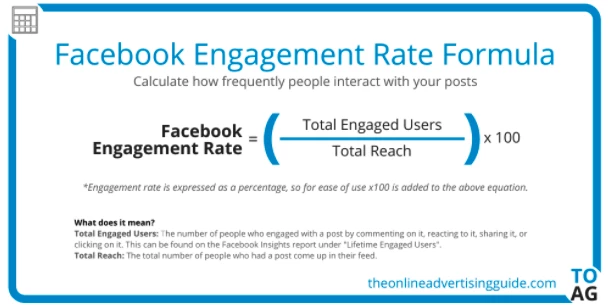
Source: theonlineadvertisingguide.com
Facebook Engagement Rate = (Engaged Users ÷ Total Reach ) x 100
Now, it is easier to find the stats for the total number of people your post has reached. But you cannot find the number of users who engaged with your post. Facebook only shows you the total number of engagements (reactions) received.
Thus, you can directly log on to Facebook > Insights >Posts > All Posts > Dropdown menu at the end > Select engagement rate. There you have it.
Now that you know how to calculate it, here’s an ideal engagement rate you should aim for.
What is a good Facebook engagement rate?
We believe that a rate of engagement of more than 1% is more than adequate.
The average engagement is between 0.5% and 0.99%, and engagement below 0.5 % indicates that your content needs improvement & more work. Anything more than 1-2% is considered fantastic engagement.
How To Increase Engagement on Facebook?
There are quite a number of ways that you can use to increase engagement. Those can be by posting content at certain times when your audience is most active or focus more so on quality content rather than quantity, and many more.
If you want to take a deeper look at the ways you can increase Facebook engagement, you can check out our blog on How To Increase Engagement On Facebook?
Apart from this, we have listed below some facebook engagement post ideas & examples to help you.
5 Facebook Engagement Post Ideas
1. Sharing Photos Of Your Audience
If you’re stuck for Facebook post ideas, consider sharing fascinating, hilarious, or viral photographs and videos. This enables your audience to share important experiences from their lives with you, which can help them form bonds with the company.
A few examples of content you can repost are quotes, memes, artwork (with permission, of course), and any other type of content you feel is worth sharing.
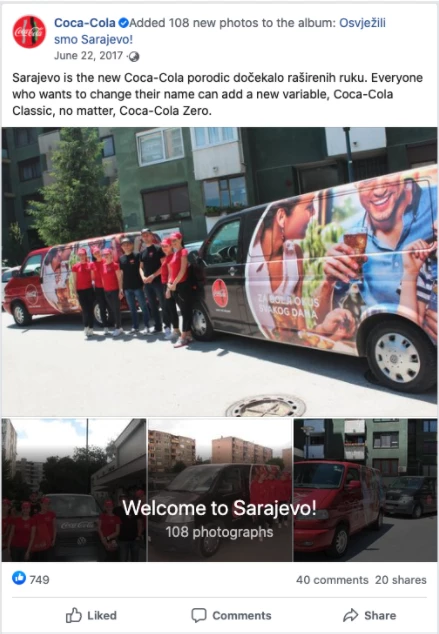
2. Ask Questions
You may ask your audience questions, riddles, puzzles to solve, hold contents, and many other things to encourage them to interact with your material!
Include relevant questions in your posts or comment sections that you know your target audience would want to answer.
This is a simple and reliable method of getting your audience to connect with you.
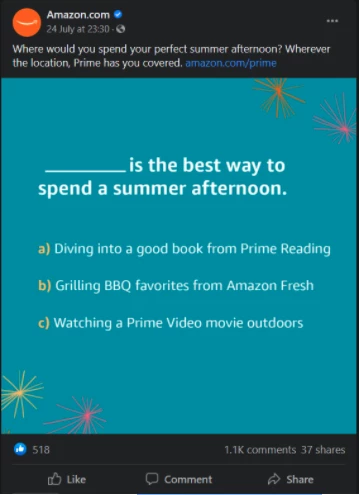
3. Product Photos
This one might come as a no-brainer. It goes without saying that every company wants to showcase its goods and services.
However, to have effective Facebook posts, you’ll need to emphasize your products in unique methods.
How can you show off your products, whether they’re being displayed or not? Consider infographics, holiday-themed themes, or use or application shots, among other ideas.
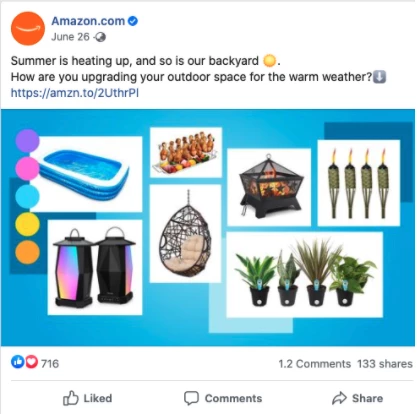
4. Post Frequently
Even while we said you should prioritize quality above quantity, that doesn’t imply you should just post once a week or focus on quality.
You will need to find the perfect balance between quantity and quality, as Facebook likes pages that post frequently. Between 3-4 times a week is optimal.
5. Promote upcoming sales/offers
If a member of your Facebook audience sees a post that advertises a deal on something they want, there’s a good chance they’ll take advantage of it.
Even if they weren’t seeking those specific goods, seeing your offer may persuade them to purchase from you.
We hope that some of the examples of Facebook post engagement have given you a clearer idea of what you should be concentrating on. Now, let’s take a look at some of the most commonly asked questions.
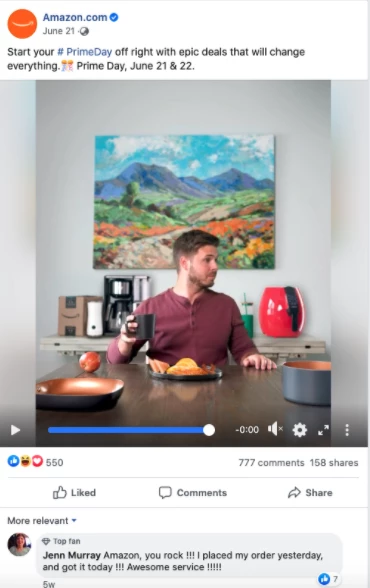
Frequently Asked Questions – F.A.Q
Q. What is the difference between reach and engagement on Facebook?
In simple terms, The number of unique visitors who see your content is best characterized as reach, whereas engagement refers to those who interact with it.
Q, What is the difference between engagements and views on Facebook?
By views, we mean the number of people who have seen your post, and by engagement, we mean the number of people who have interacted with it (likes, comments, shares)
That concludes our article on what is Facebook engagement; we hope you learned something new and gained some useful advice.
We understand that at a time like today when covid -19 is wreaking havoc on brands, businesses are moving their marketing efforts from conventional to digital.
As a result, both large and small businesses are focusing on digital marketing and the use of social media platforms to promote their brands and raise awareness.
This is why, at IIDE, we provide digital marketing corporate training to companies interested in getting professional solution-based strategies.
We create your modules based on your company’s aims and goals, allowing us to maximize your return on investment and help you get the most bang for your money. Once the solution is curated, your employees are trained in it as well.
Bonus: Sign up for this exclusive Free Masterclass on digital marketing basics taught by me. Why? because I have 10+ years of experience in the digital marketing field have covered a lot of topics that are essential for anyone learning about digital marketing.
Thank you for taking the time to read our blog and for your interest! If you’ve made it this far, we’d like to hear your views/comments below.

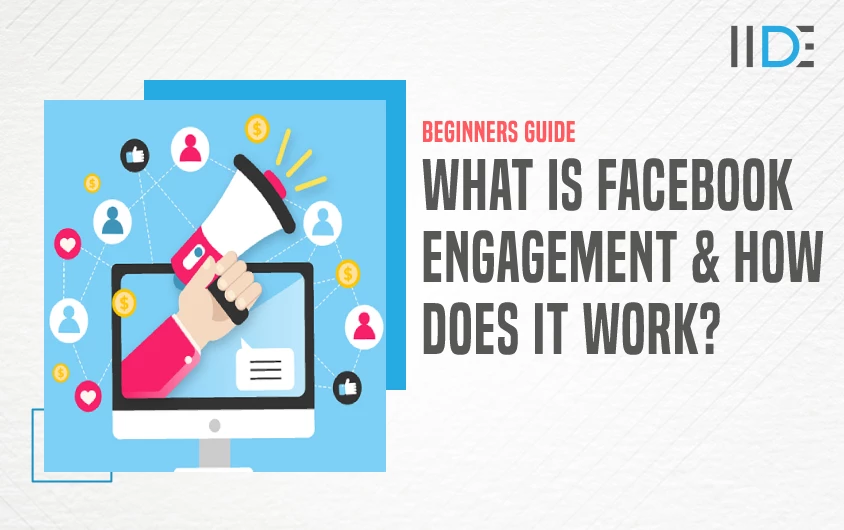
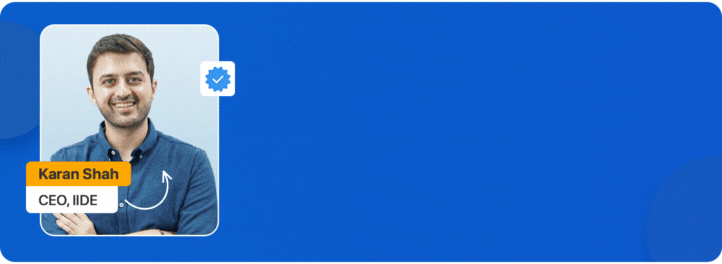



![A Comprehensive Guide to an MBA in Digital Marketing in Sharjah, [year].](https://iide.co/wp-content/w3-webp/uploads/2023/08/DM-Courses-in-India-5-2-396x250.pngw3.webp)
0 Comments